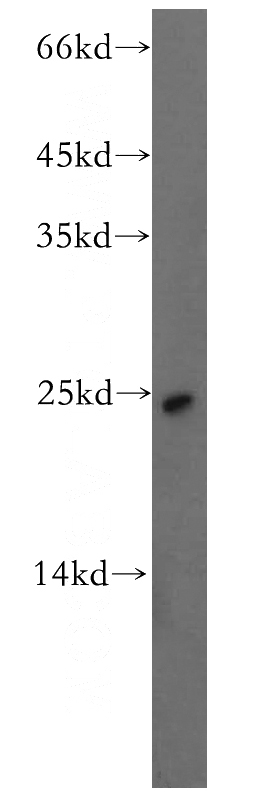-
Product Name
BMF antibody
- Documents
-
Description
BMF Rabbit Polyclonal antibody. Positive WB detected in human placenta tissue, HEK-293 cells. Observed molecular weight by Western-blot: 24kd
-
Tested applications
ELISA, WB
-
Species reactivity
Human; other species not tested.
-
Alternative names
BMF antibody; FLJ00065 antibody
-
Isotype
Rabbit IgG
-
Preparation
This antibody was obtained by immunization of Peptide (Accession Number: NM_001398507). Purification method: Antigen affinity purified.
-
Clonality
Polyclonal
-
Formulation
PBS with 0.02% sodium azide and 50% glycerol pH 7.3.
-
Storage instructions
Store at -20℃. DO NOT ALIQUOT
-
Applications
Recommended Dilution:
WB: 1:200-1:2000
-
Validations

human placenta tissue were subjected to SDS PAGE followed by western blot with Catalog No:117192(BMF antibody) at dilution of 1:300
-
Background
BMF belongs to the BCL2 protein family. BCL2 family members form hetero- or homodimers and act as anti- or pro-apoptotic regulators that are involved in a wide variety of cellular activities such as central regulators of apoptotic cell death. BMF contains a single BCL2 homology domain 3 (BH3), and has been shown to bind BCL2 proteins and function as an apoptotic activator. This protein is found to be sequestered to myosin V motors by its association with dynein light chain 2, which may be important for sensing intracellular damage and triggering apoptosis. Alternatively spliced transcript variants encoding different isoforms have been identified. BMF is widely expressed in tissues such as pancreas, liver and kidney, and in hematopoietic tissues.
-
References
- Yu G, Jiang L, Xu Y. Silencing prion protein in MDA-MB-435 breast cancer cells leads to pleiotropic cellular responses to cytotoxic stimuli. PloS one. 7(11):e48146. 2012.
Related Products / Services
Please note: All products are "FOR RESEARCH USE ONLY AND ARE NOT INTENDED FOR DIAGNOSTIC OR THERAPEUTIC USE"
